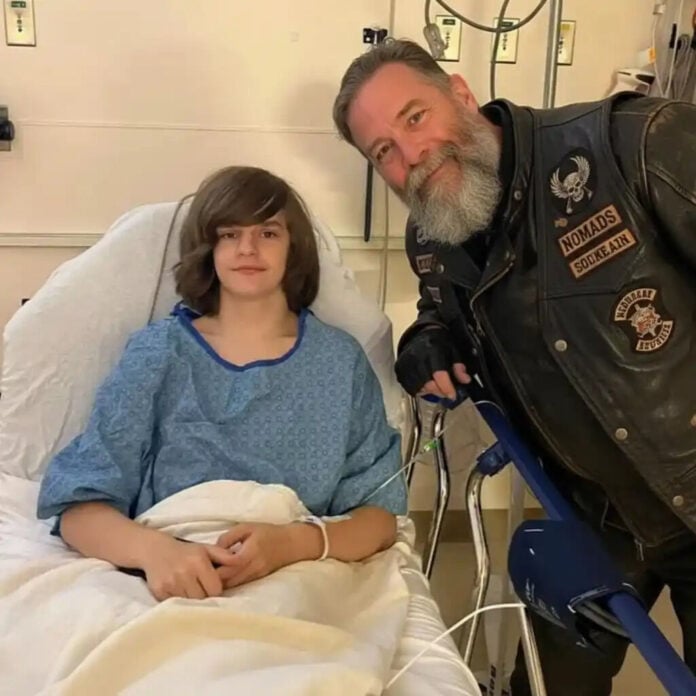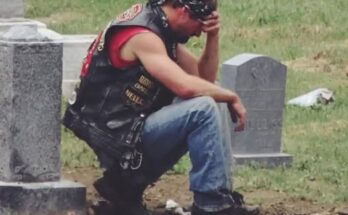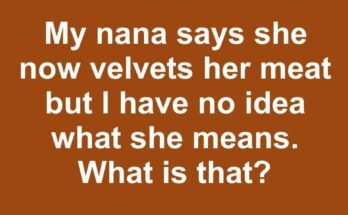The Accident That Changed Everything
Forty-seven days. That’s how long my twelve-year-old son, Jake, lay motionless in a hospital bed after being hit by a motorcycle. Forty-seven days since the sound of screeching tires and sirens shattered our lives.
The police said it was an accident — that Jake had chased a basketball into the street, that the rider wasn’t speeding, wasn’t drinking, that he had even stayed at the scene and performed CPR until the ambulance arrived.
But when you’re a parent watching your child fight for his life, logic doesn’t matter. All I could see was the man who had taken my boy away from me.
His name was Marcus, though I didn’t know it at first. The first time I saw him was on the third day. I walked into Jake’s room, and there he was — a tall man in a leather vest, gray in his beard, reading Harry Potter out loud beside my son’s bed.
I lost it. I shouted, demanded he leave, nearly swung at him before hospital security stepped in.
But the next day, he came back. And the day after that.
I wanted to hate him — I did hate him — but my wife, Sarah, saw something I couldn’t.
“He didn’t run,” she said. “He stayed. He helped. Maybe he needs this as much as Jake does.”
I couldn’t understand then how right she was.
The Stranger Who Wouldn’t Leave
Every morning, Marcus sat in the same chair beside Jake’s bed. Sometimes he’d read aloud. Other times, he’d talk to him like an old friend: about motorcycles, about baseball, about the weather.
He brought in Jake’s favorite stories — Harry Potter, Percy Jackson, The Hobbit. He even told him stories about his own son, Danny, who had died in a car accident twenty years earlier.
“My boy loved bikes,” Marcus said one day. “Used to help me fix mine in the garage. He was about Jake’s age when he died. I wasn’t there when it happened. I’ve been trying to make peace with that ever since.”
He paused, voice breaking. “I couldn’t be there for Danny. But I can be here for your boy.”
That was the first moment I saw him not as a villain, but as a grieving father trying to make something right.
An Unlikely Friendship
By the third week, something had changed. I no longer avoided the hospital room when Marcus was there. We’d sit together, each keeping silent watch over my son.
Sometimes, I’d find Marcus whispering, “Come on, buddy. You’ve got a whole world waiting for you. Don’t give up now.”
On the twenty-third day, Marcus brought his motorcycle club — fifteen riders from the Nomads — who filled the hallway in their leather vests. They couldn’t fit in the room, so they went outside and revved their bikes in unison, their engines echoing through the hospital walls.
“Jake loves motorcycles,” Sarah said, crying. “If he can hear anything, maybe he’ll hear that.”
That night, the nurse said Jake’s heart rate spiked briefly.
The Longest Wait
By day thirty, the doctors started using words like permanent damage and long-term care. I couldn’t bear it. I collapsed in the hallway, sobbing.
Marcus found me there and sat beside me without saying a word. After a while, he simply said, “You can’t give up on him. Not yet.”
His faith didn’t make sense, but it gave me strength.
On day forty-five, he brought a small box — a model motorcycle kit. “For when he wakes up,” he said. “We’ll build it together.”
I nodded, too choked up to speak.
The Forty-Seventh Day
It was early morning. Marcus was already there, reading softly when I walked in.
Then, I saw it — a small twitch in Jake’s hand.
“Marcus,” I whispered. “Did you see that?”
We froze. Then Jake’s fingers moved again. The machines beeped wildly. His eyelids fluttered.
“Jake!” I called, grabbing his hand. “Buddy, it’s Dad. Can you hear me?”
And then his eyes opened.
The nurses rushed in. My heart felt like it might burst. Jake looked confused, his gaze darting between us — and then landed on Marcus.
“You…” he whispered, his voice raspy. “You’re the man who saved me.”
Marcus blinked, stunned. “Son, I— I hit you with my bike.”
Jake shook his head weakly. “You stopped. You pulled me back. You held me and told me I’d be okay. You saved me.”
Tears rolled down Marcus’s face — this big, tattooed biker crying openly beside my son’s hospital bed.
Healing Together
Jake’s recovery was slow but steady. His memory was intact. The doctors said it was a miracle.
He remembered everything — chasing the basketball, running into the street, seeing the motorcycle too late, Marcus’s hand grabbing him, the voice telling him not to close his eyes.
And he remembered Marcus reading to him while he was in the coma.
“I heard you,” Jake said quietly one day. “You talked about your son. I didn’t want you to be sad anymore.”
After that, Marcus visited every day until Jake was discharged. On that last day, he gave Jake a gift: a small leather vest with the words HONORARY NOMAD stitched on the back.
“You’re family now,” Marcus said. “You fought your way back. That’s what our club stands for.”
Jake hugged him tight.
Two Years Later
Jake’s fourteen now — healthy, happy, playing baseball again. Marcus still comes over every Sunday for dinner. Jake calls him Uncle Marcus. They built that model motorcycle together, and now they’re rebuilding a real one in my garage.
Sometimes I catch them laughing, heads bent over the bike, grease on their hands — the biker who hit my son and the boy who changed his life.
Marcus told me once that forgiveness isn’t something you earn — it’s something you live. Watching him with Jake, I finally understand what he meant.
He didn’t just save my boy’s life that day on the street. He saved something inside all of us — faith, hope, and the belief that people can choose to turn pain into purpose.
Last week, Marcus’s motorcycle club hosted a charity ride for children’s hospital patients. Jake rode behind him, proudly wearing his honorary vest. I followed in my car, watching the two of them ahead — one man haunted by the past, one boy given a second chance.
And I realized: sometimes angels don’t have wings. Sometimes they wear leather jackets, ride Harleys, and show up every day — even when they don’t have to.



